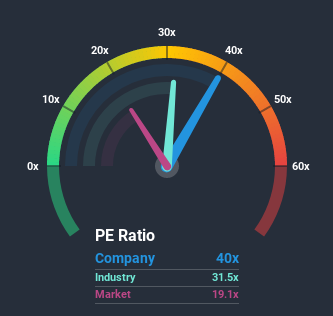Some Shareholders Feeling Restless Over Visa Inc.'s (NYSE:V) P/E Ratio

When close to half the companies in the United States have price-to-earnings ratios (or "P/E's") below 19x, you may consider Visa Inc. (NYSE:V) as a stock to avoid entirely with its 40x P/E ratio. Nonetheless, we'd need to dig a little deeper to determine if there is a rational basis for the highly elevated P/E.
Visa certainly has been doing a good job lately as its earnings growth has been positive while most other companies have been seeing their earnings go backwards. The P/E is probably high because investors think the company will continue to navigate the broader market headwinds better than most. You'd really hope so, otherwise you're paying a pretty hefty price for no particular reason.
See our latest analysis for Visa
If you'd like to see what analysts are forecasting going forward, you should check out our free report on Visa.
How Is Visa's Growth Trending?
There's an inherent assumption that a company should far outperform the market for P/E ratios like Visa's to be considered reasonable.
If we review the last year of earnings, the company posted a result that saw barely any deviation from a year ago. Still, the latest three year period has seen an excellent 95% overall rise in EPS, in spite of its uninspiring short-term performance. Accordingly, shareholders would have probably welcomed those medium-term rates of earnings growth.
Looking ahead now, EPS is anticipated to climb by 15% per year during the coming three years according to the analysts following the company. Meanwhile, the rest of the market is forecast to expand by 13% per annum, which is not materially different.
With this information, we find it interesting that Visa is trading at a high P/E compared to the market. Apparently many investors in the company are more bullish than analysts indicate and aren't willing to let go of their stock right now. These shareholders may be setting themselves up for disappointment if the P/E falls to levels more in line with the growth outlook.
The Bottom Line On Visa's P/E
Generally, our preference is to limit the use of the price-to-earnings ratio to establishing what the market thinks about the overall health of a company.
Our examination of Visa's analyst forecasts revealed that its market-matching earnings outlook isn't impacting its high P/E as much as we would have predicted. When we see an average earnings outlook with market-like growth, we suspect the share price is at risk of declining, sending the high P/E lower. This places shareholders' investments at risk and potential investors in danger of paying an unnecessary premium.
We don't want to rain on the parade too much, but we did also find 2 warning signs for Visa that you need to be mindful of.
Of course, you might also be able to find a better stock than Visa. So you may wish to see this free collection of other companies that sit on P/E's below 20x and have grown earnings strongly.
This article by Simply Wall St is general in nature. It does not constitute a recommendation to buy or sell any stock, and does not take account of your objectives, or your financial situation. We aim to bring you long-term focused analysis driven by fundamental data. Note that our analysis may not factor in the latest price-sensitive company announcements or qualitative material. Simply Wall St has no position in any stocks mentioned.
Have feedback on this article? Concerned about the content? Get in touch with us directly. Alternatively, email editorial-team@simplywallst.com.

 Yahoo Finance
Yahoo Finance 
